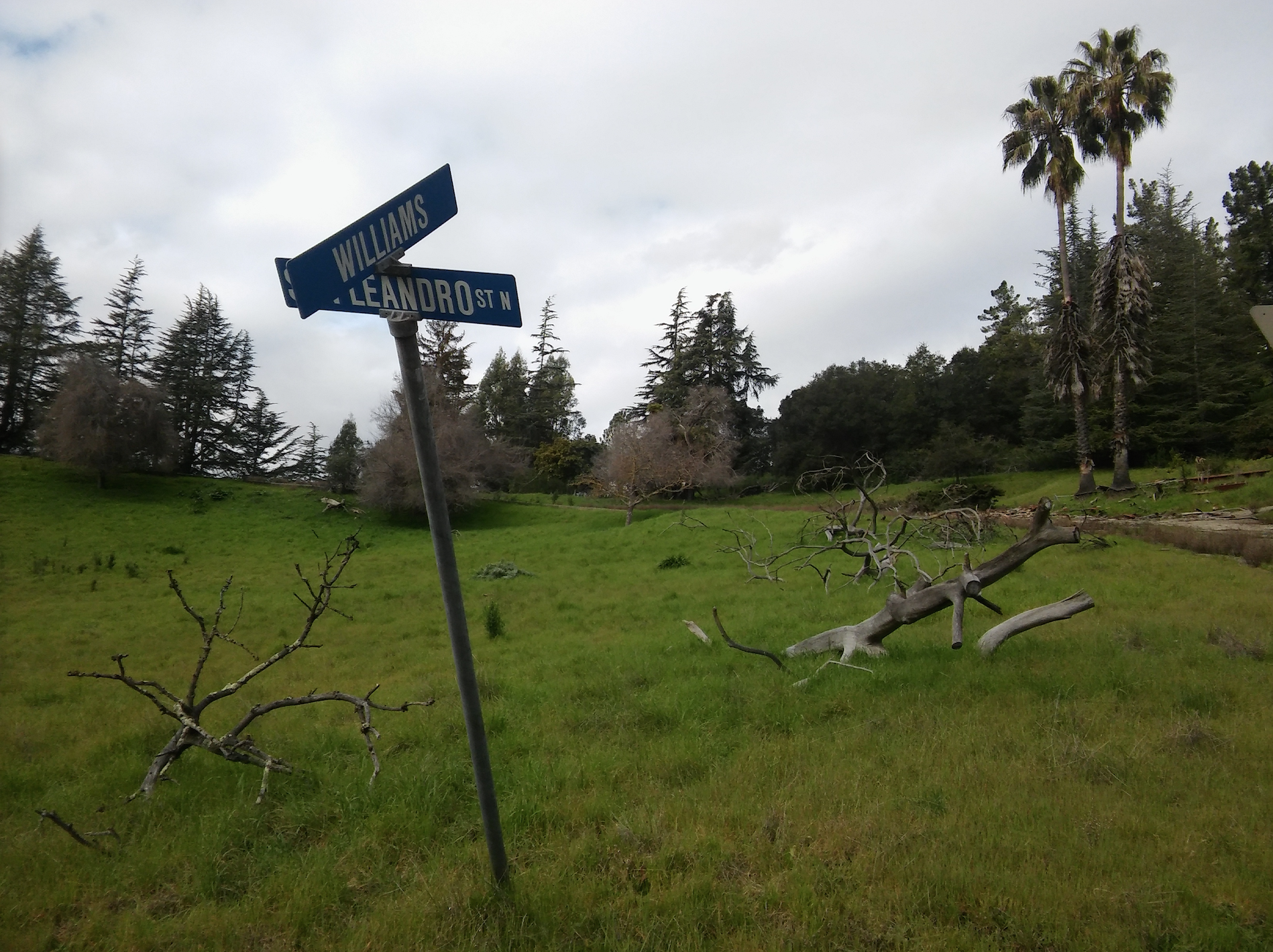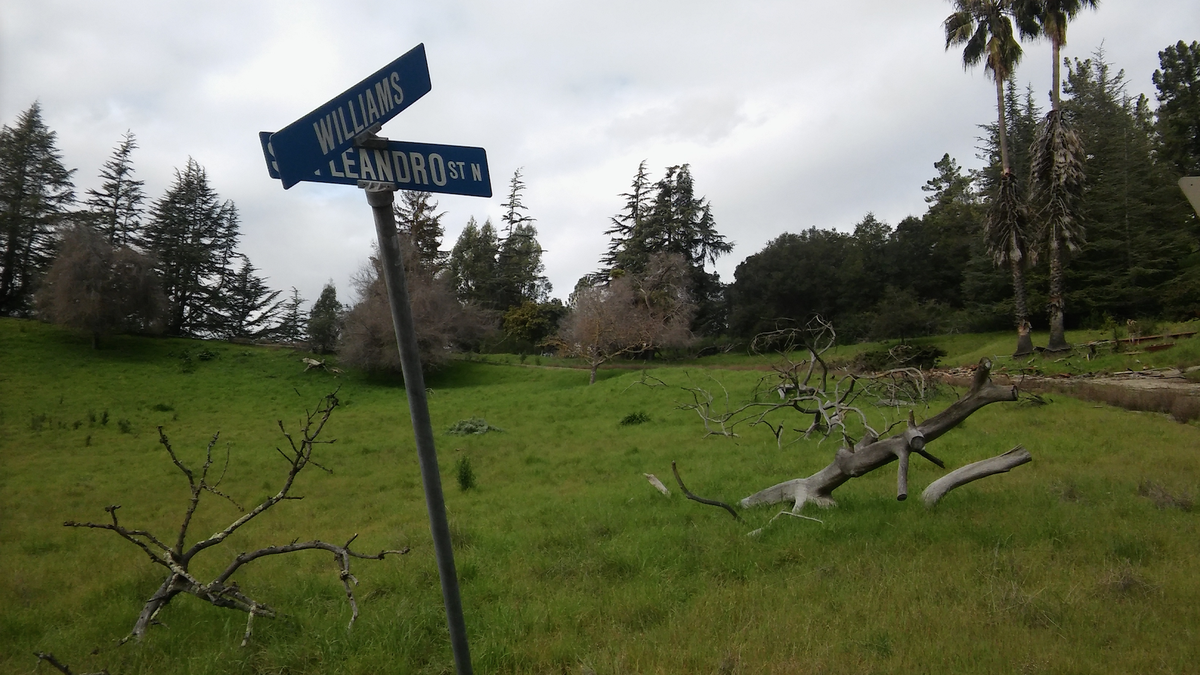
Oakland Councilmember Larry Reid has been trying to seal the deal at Oak Knoll since 1992, when he was just a staffer working for then Mayor Elihu Harris. Last night, his quest was finally fulfilled.
Oak Knoll is a sprawling 183 acres of woodlands climbing from the 580 freeway up to a ridge overlooking the bay. From 1942 to 1996, it was the location of a naval hospital. But after the military left, the scenic real estate sat empty for decades. It’s the largest undeveloped slice of land anywhere in Oakland.
Since 2005, developer SunCal has been trying to make its vision of Oak Knoll a reality, but the 2008 recession put everything on hold. Then in 2014, SunCal revived the project, proposing this time to build 918 homes with retail, parks, and other facilities.
Councilmember Reid has staked much of his political capital on the project’s success.
But the current development plan isn’t without detractors.
“You should be ashamed to give away such a large part of the city,” said James Vann of the Oakland Tenants Union, “for an elitist development with not one unit of affordable housing.” Vann and many others wanted the council to require some inclusion of affordable housing on the site.
Building trades workers want the city to require SunCal to sign a project labor agreement with their unions to guarantee jobs on the project will pay living wages.
Many neighbors who live around the project site have put pressure on SunCal and the city to prevent affordable housing from being included. As a result, all 918 units will sell at market rate, starting around $700,000 for townhouses and climbing to $1.2 million for large single family homes.
And only one union, the Laborers International Union of North America Local 304, was able to strike a deal with SunCal. Its members packed the council chambers and urged a yes vote, hoping to fill hundreds of jobs building infrastructure and housing for SunCal’s subcontractors.
Most other unions urged the council to give them more time to negotiate with SunCal. “All the other building trades are opposed,” said Luis Lopez, an electrician represented by the International Brotherhood of Electrical Workers.
Jeff Dixon, another tradesman, told the council it would be a “dangerous precedent” to approve Oak Knoll. He called it an “exclusive community for the very wealthy, built by the lowest paid workers.”
Supporters of the project countered that its raw economic impact will outweigh the low wages, non-union labor, and absence of affordable housing.
Sarah Chavez, a director of the Oakland Builder’s Alliance, pointed to an economic impact study showing the development will generate $8.1 million in annual property taxes and $28 million in yearly sales taxes from new residents who shop within Oakland.
And as builders pull permits to construct the 918 homes — the homes will be built in phases over multiple years — Oak Knoll will also eventually generate about $20 million in affordable housing impact fees, according to the planning commission.
But several councilmembers asked that the vote be delayed or that the approval be amended to add new requirements.
Councilmember Abel Guillen attempted to amend the project’s approval with a requirement that the developer fund and build a new fire station. Guillen said he is concerned Oak Knoll’s thousands of new residents will put an unsustainable burden on the fire department, especially because the project will put almost one thousand homes in the hills where the fire hazard is high. They’ll be served by two of the city’s busiest fire stations.
Reid angrily responded to Guillen’s proposed amendments to the deal by calling Guillen “disingenuous.” Reid claimed that Guillen had earlier promised him support for the project. “I will never take you at your word again,” he complained before he rejected Guillen’s amendments.
Councilmember Dan Kalb said he was concerned about the lack of affordable housing, the absence of a project labor agreement, and that he shared Guillen’s concerns about increased fire danger.
Reid shot back that Kalb didn’t attend any community meetings about the project and then accused Kalb of political grandstanding.
“I understand you are running for assembly,” he said about Kalb’s campaign for the Assembly District 15 seat, “you’re playing everybody.”
“Sometimes you have to stop being disingenuous,” Reid said.
Councilmember Rebecca Kaplan was able to point out that some affordable housing at Oak Knoll is still possible, however, because SunCal recently decided not to purchase a 5.5-acre city-owned property within the development known as the Barcelona parcel.
“We are open to on-site affordable,” Joe Aguirre, a spokesman for SunCal wrote the Express about the possibility of affordable housing.
Kaplan asked for several minor changes to the resolution to preserve the city’s ability to build affordable housing there.
When the vote came, it was 5-3, with Guillen, Kalb, and Noel Gallo in the minority.
After the vote, Reid triumphantly threw up his hands.
Clarification: this story’s headline was updated to note that SunCal has a labor agreement with one union, but a project labor agreement covering upwards of 20 other construction trades unions was not part of the development deal approved by the council last night.














